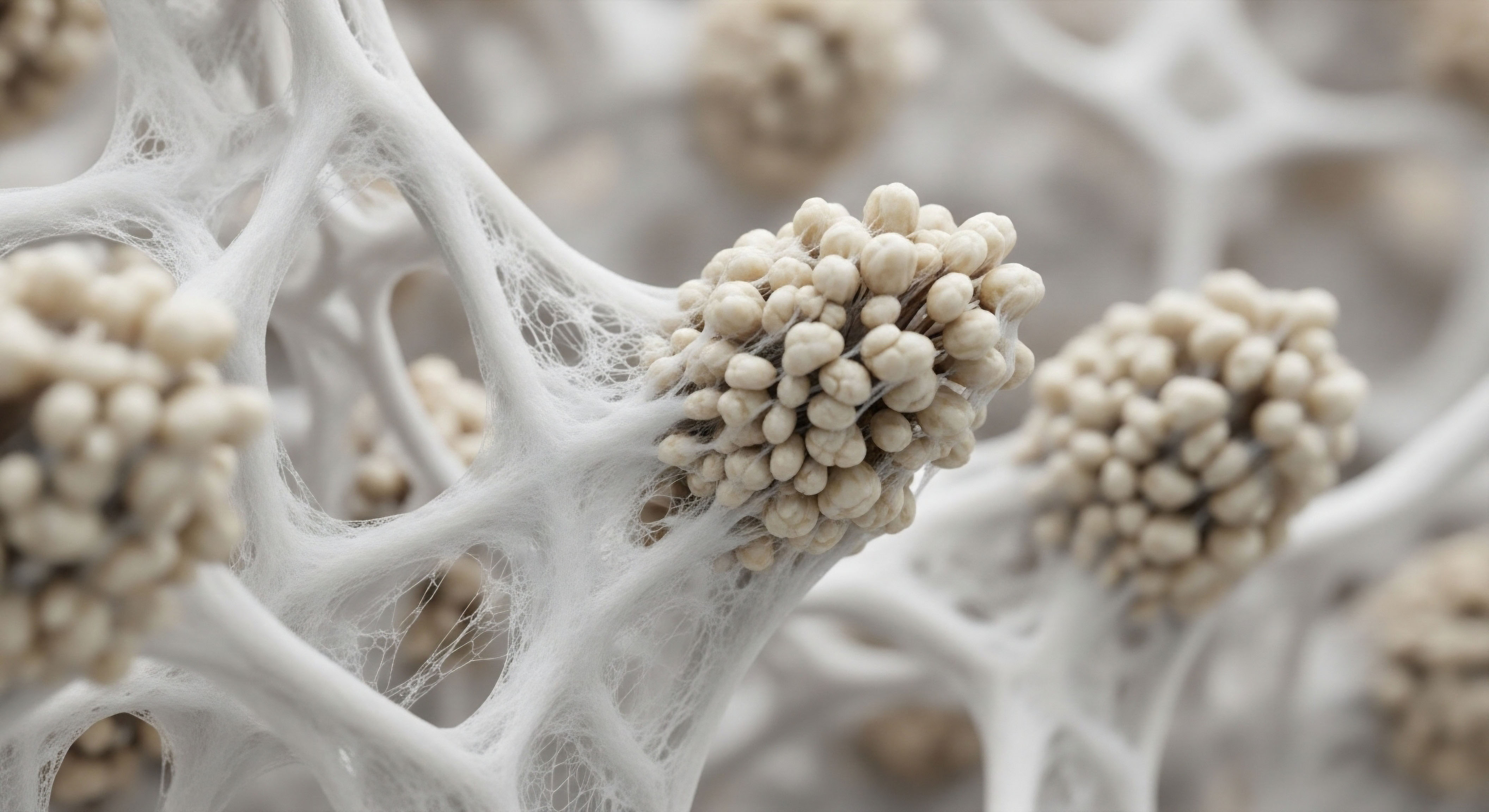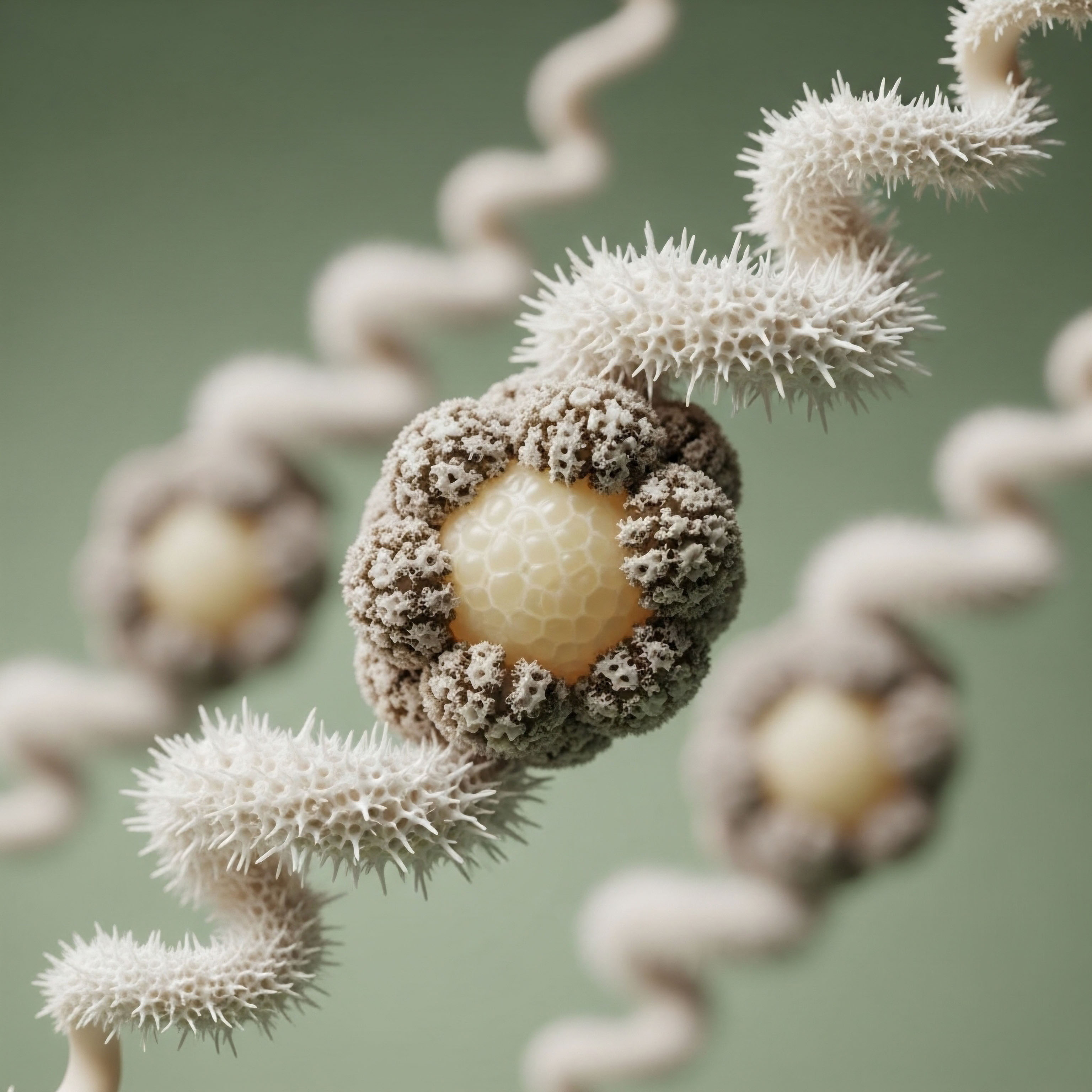

Fundamentals
Many individuals experience a subtle yet persistent shift in their well-being, a feeling that something within their biological systems is simply not operating as it once did. This often manifests as a decline in vitality, a change in mood, or a diminished capacity for physical activity.
Perhaps you have noticed a persistent fatigue that defies rest, a struggle with maintaining a healthy body composition, or a general sense of unease that seems to defy simple explanations. These sensations are not merely a consequence of aging; they often signal a deeper conversation occurring within your body, a dialogue orchestrated by your endocrine system. Understanding this internal communication is the first step toward reclaiming your optimal function.
The body’s intricate network of glands and hormones acts as a sophisticated messaging service, directing virtually every physiological process. Hormones, these chemical messengers, travel through the bloodstream, delivering instructions to cells and tissues throughout the body. They regulate metabolism, influence mood, control reproductive functions, and play a significant role in maintaining overall systemic balance. When this delicate hormonal equilibrium is disrupted, the effects can ripple across multiple systems, including the immune system.
A decline in vitality or persistent fatigue often signals a deeper conversation within the body, orchestrated by the endocrine system.
The immune system, our body’s defense mechanism, constantly works to protect against external threats and internal cellular anomalies. It distinguishes between self and non-self, launching targeted responses to pathogens while tolerating healthy tissues. This remarkable system is not an isolated entity; it communicates extensively with the endocrine system.
Hormones can directly influence immune cell development, function, and signaling pathways. Conversely, immune mediators, such as cytokines, can affect hormone production and release. This bidirectional communication means that sustained alterations in hormonal levels can have profound, long-term implications for immune competence and regulation.

Hormonal Messengers and Immune System Basics
To appreciate the interconnectedness, consider the fundamental roles of these two systems. The endocrine system produces and secretes hormones that regulate growth, metabolism, reproduction, and mood. Key players include the adrenal glands, thyroid gland, pituitary gland, and gonads. Each gland contributes specific hormones that exert widespread effects. For instance, thyroid hormones regulate metabolic rate, while adrenal hormones, such as cortisol, mediate stress responses.
The immune system comprises a complex array of cells, tissues, and organs that work in concert to protect the body. It includes white blood cells like lymphocytes and phagocytes, as well as organs such as the thymus, spleen, and lymph nodes. The immune response can be broadly categorized into two types:
- Innate immunity ∞ This is the body’s first line of defense, providing immediate, non-specific protection against pathogens. It involves physical barriers, phagocytic cells, and natural killer cells.
- Adaptive immunity ∞ This highly specific defense system targets particular pathogens and develops memory for future encounters. It involves T-cells and B-cells, which produce antibodies.
The interaction between these two vital systems is constant and dynamic. Hormones can modulate the activity of immune cells, influencing their proliferation, differentiation, and cytokine production. For example, glucocorticoids, a class of steroid hormones, are well-known for their immunosuppressive effects, often prescribed to reduce inflammation. Conversely, sex hormones like testosterone and estrogen also exert significant, albeit more complex, influences on immune function. Understanding these foundational interactions provides a framework for considering the broader implications of sustained hormone administration.


Intermediate
When considering the deliberate administration of hormones, such as in hormonal optimization protocols, a deeper understanding of their systemic effects becomes paramount. These protocols, designed to recalibrate biochemical balance, extend beyond simply addressing symptomatic relief. They inherently interact with the body’s immunological landscape, influencing cellular responses and inflammatory pathways. The goal is to restore physiological levels, thereby supporting overall well-being, including robust immune function.

Testosterone Replacement Therapy and Immune Modulation
Testosterone, a primary androgen, plays a significant role in immune regulation, with distinct effects observed in both men and women. For men experiencing symptoms of low testosterone, often termed andropause, Testosterone Replacement Therapy (TRT) protocols aim to restore circulating levels to a healthy physiological range. A standard approach involves weekly intramuscular injections of Testosterone Cypionate, typically at a concentration of 200mg/ml. This is often complemented by other agents to maintain endocrine system integrity.
To preserve natural testosterone production and fertility, Gonadorelin is frequently administered via subcutaneous injections, usually twice weekly. This peptide stimulates the pituitary gland to release luteinizing hormone (LH) and follicle-stimulating hormone (FSH). Additionally, an oral tablet of Anastrozole, taken twice weekly, may be included to mitigate the conversion of testosterone to estrogen, thereby reducing potential side effects such as gynecomastia or fluid retention.
In some cases, Enclomiphene might be incorporated to further support LH and FSH levels, offering another avenue for maintaining testicular function.
Testosterone replacement protocols aim to restore physiological levels, supporting overall well-being, including robust immune function.
The immunological implications of testosterone administration are complex. Testosterone generally exhibits immunosuppressive properties, particularly at supraphysiological levels, which can reduce inflammatory responses. However, within physiological ranges, it supports the maturation and function of various immune cells. Research indicates that men with hypogonadism often present with a pro-inflammatory state, which can improve with appropriate testosterone restoration. This suggests that maintaining optimal testosterone levels can contribute to a more balanced immune response, rather than simply suppressing it.

Testosterone Protocols and Immune Cell Activity
For women, hormonal balance is equally vital, particularly during peri-menopause and post-menopause, when fluctuations can lead to a range of symptoms including irregular cycles, mood changes, hot flashes, and diminished libido. Testosterone administration for women typically involves lower doses, such as 10 ∞ 20 units (0.1 ∞ 0.2ml) of Testosterone Cypionate weekly via subcutaneous injection.
Progesterone is often prescribed alongside, with the specific regimen tailored to the woman’s menopausal status. Long-acting pellet therapy, which delivers a steady release of testosterone, can also be considered, with Anastrozole added if estrogen conversion becomes a concern.
The immune system in women is significantly influenced by sex hormones. Estrogen, for instance, tends to be immunostimulatory, which may contribute to the higher prevalence of autoimmune conditions in women. Testosterone in women, even at lower physiological concentrations, can modulate immune cell activity, potentially reducing certain inflammatory markers. The careful titration of these hormones aims to achieve a state of hormonal equilibrium that supports not only symptomatic relief but also a resilient immune system.

Growth Hormone Peptide Therapy and Immune System Support
Beyond direct hormone administration, peptide therapies offer another avenue for biochemical recalibration, often with indirect but significant immunological benefits. These peptides stimulate the body’s own production of growth hormone, which has widespread systemic effects. Active adults and athletes often seek these therapies for anti-aging benefits, muscle gain, fat loss, and sleep improvement.
Key peptides utilized in these protocols include:
- Sermorelin ∞ A growth hormone-releasing hormone (GHRH) analog that stimulates the pituitary gland.
- Ipamorelin / CJC-1295 ∞ These peptides work synergistically to increase growth hormone secretion. Ipamorelin is a selective growth hormone secretagogue, while CJC-1295 is a GHRH analog with a longer half-life.
- Tesamorelin ∞ Another GHRH analog, specifically approved for reducing visceral fat in certain conditions.
- Hexarelin ∞ A potent growth hormone secretagogue that also has cardioprotective properties.
- MK-677 ∞ An oral growth hormone secretagogue that increases growth hormone and IGF-1 levels.
Growth hormone itself plays a role in immune function, influencing the development and activity of lymphocytes, macrophages, and natural killer cells. Optimal growth hormone levels can support thymic function, which is crucial for T-cell maturation, particularly as individuals age. By stimulating endogenous growth hormone production, these peptides can indirectly contribute to a more robust and responsive immune system, aiding in tissue repair and overall cellular health.

Targeted Peptides for Immune and Tissue Health
Other targeted peptides also offer specific benefits that can indirectly support immune resilience:
PT-141, or Bremelanotide, is primarily used for sexual health, acting on melanocortin receptors in the brain to improve libido. While its direct immunological effects are not the primary focus, overall physiological balance contributes to systemic health.
Pentadeca Arginate (PDA) is a peptide recognized for its roles in tissue repair, healing processes, and inflammation modulation. Its ability to support cellular regeneration and reduce excessive inflammatory responses can indirectly benefit immune system recovery and overall resilience, particularly after injury or stress.
The precise administration of these agents, whether hormones or peptides, requires careful monitoring and individual tailoring. The goal is always to achieve a state of physiological balance that supports the body’s inherent capacity for health, including its immunological defenses.
Consider the following comparison of common hormonal and peptide therapies and their general immunological considerations:
| Therapy Type | Primary Mechanism | General Immunological Consideration |
|---|---|---|
| Testosterone Replacement (Men) | Restores androgen levels | Can reduce chronic inflammation, support immune cell function within physiological range. |
| Testosterone Replacement (Women) | Balances androgen levels | Modulates immune cell activity, potentially reducing inflammatory markers. |
| Progesterone (Women) | Balances progesterone levels | Immunomodulatory, often with anti-inflammatory effects, particularly in reproductive tissues. |
| Growth Hormone Peptides | Stimulates endogenous GH production | Supports thymic function, lymphocyte development, and overall cellular repair. |
| Pentadeca Arginate (PDA) | Tissue repair, inflammation modulation | Aids in resolving inflammation, supporting immune system recovery after tissue damage. |


Academic
The long-term immunological implications of sustained hormone administration extend into the intricate molecular and cellular pathways that govern the endocrine-immune axis. This is not a simple cause-and-effect relationship; rather, it involves a dynamic interplay where hormonal signals can fine-tune immune responses, and immune mediators can, in turn, influence endocrine function. A deep exploration requires examining the specific receptor interactions, gene expression changes, and cellular signaling cascades that underpin these connections.

How Do Sex Hormones Influence Immune Cell Development and Function?
Sex hormones, including androgens and estrogens, exert profound effects on both innate and adaptive immunity. Immune cells, such as lymphocytes, macrophages, and dendritic cells, express receptors for these steroid hormones, allowing for direct modulation of their activity. For instance, androgen receptors (AR) are present on T-cells, B-cells, and natural killer (NK) cells.
Testosterone, binding to these receptors, can influence T-cell differentiation, cytokine production, and overall immune cell proliferation. Sustained physiological testosterone levels, as achieved through appropriate biochemical recalibration, can contribute to a balanced immune response, potentially mitigating chronic low-grade inflammation often associated with hypogonadal states.
Estrogens, acting through estrogen receptors (ERα and ERβ), also significantly shape immune responses. ERα is widely expressed on immune cells and generally mediates immunostimulatory effects, while ERβ often mediates immunosuppressive or anti-inflammatory actions. The balance between these receptor subtypes, and the specific estrogen metabolites present, dictates the overall immune outcome.
In women, the cyclical fluctuations of estrogen and progesterone throughout the menstrual cycle, and their decline during menopause, correlate with shifts in immune surveillance and inflammatory profiles. Sustained administration of these hormones, particularly in contexts like female hormonal optimization, aims to restore a more homeostatic environment, potentially influencing the prevalence and severity of autoimmune conditions.
Sex hormones profoundly influence both innate and adaptive immunity through specific receptor interactions on immune cells.
The impact of sustained hormone administration on immune cell populations can be observed in various contexts. For example, research indicates that physiological testosterone levels support the integrity of the thymic gland, an organ vital for T-cell maturation. Age-related thymic involution, a natural process of decline, can be attenuated by maintaining optimal hormonal environments, thereby supporting a more robust adaptive immune system into later life. This suggests that carefully managed hormonal support can contribute to immunological resilience over time.

Growth Hormone and Immune System Crosstalk
The growth hormone (GH) and insulin-like growth factor 1 (IGF-1) axis represents another critical endocrine pathway with extensive immunological crosstalk. Growth hormone receptors are expressed on various immune cells, including lymphocytes, macrophages, and neutrophils. GH directly influences the proliferation, differentiation, and functional activity of these cells. For instance, GH can enhance phagocytic activity of macrophages and promote the proliferation of T-cells and B-cells.
Peptide therapies, such as those involving Sermorelin or Ipamorelin/CJC-1295, work by stimulating the endogenous pulsatile release of growth hormone from the pituitary gland. This approach aims to restore more youthful GH secretion patterns, which can have downstream effects on immune function. A decline in GH levels with age is associated with immunosenescence, characterized by a reduced capacity to mount effective immune responses and an increase in chronic low-grade inflammation. By supporting GH secretion, these peptides can potentially:
- Enhance Thymic Output ∞ Promote the production of new T-cells, which are crucial for adaptive immunity.
- Modulate Cytokine Production ∞ Influence the balance of pro-inflammatory and anti-inflammatory cytokines.
- Improve Immune Surveillance ∞ Support the overall responsiveness of the immune system to pathogens and cellular anomalies.
The long-term administration of these peptides, when carefully monitored, seeks to optimize the GH-IGF-1 axis, thereby contributing to a more youthful and effective immune system, reducing the vulnerability to age-related immune dysfunction.

Metabolic Health and Immune Homeostasis
The interplay between hormonal health, metabolic function, and the immune system forms a complex web. Hormones like insulin, leptin, and adiponectin, which are central to metabolic regulation, also directly influence immune cell function and inflammatory pathways. Chronic metabolic dysregulation, such as insulin resistance or obesity, is often accompanied by a state of chronic low-grade inflammation, termed metaflammation.
This persistent inflammatory state can impair immune responses, making the body more susceptible to infections and contributing to the progression of chronic diseases.
Sustained hormonal optimization protocols, by improving metabolic parameters, can indirectly support immune homeostasis. For example, restoring optimal testosterone levels in men with hypogonadism can improve insulin sensitivity and reduce visceral adiposity, thereby mitigating metaflammation. Similarly, balancing sex hormones in women can positively influence metabolic markers. This holistic approach recognizes that immune resilience is not merely a function of direct immune cell modulation but is deeply intertwined with overall metabolic health and hormonal signaling.
The following table summarizes key interactions within the endocrine-immune axis relevant to sustained hormone administration:
| Hormone/Peptide | Immune Cell Receptor | Key Immunological Effect | Long-Term Implication of Sustained Administration |
|---|---|---|---|
| Testosterone | Androgen Receptor (AR) on T-cells, B-cells, NK cells | Modulates T-cell differentiation, cytokine production; generally immunosuppressive at high doses, supportive at physiological levels. | Supports thymic function, reduces chronic inflammation in hypogonadal states, maintains immune balance. |
| Estrogen | Estrogen Receptors (ERα, ERβ) on lymphocytes, macrophages | ERα often immunostimulatory; ERβ often anti-inflammatory; influences autoimmune disease susceptibility. | Contributes to immune homeostasis, particularly in women; may modulate inflammatory responses. |
| Progesterone | Progesterone Receptor (PR) on immune cells | Immunomodulatory, often anti-inflammatory; important in reproductive immunology. | Supports immune tolerance, reduces inflammation in specific tissues. |
| Growth Hormone | Growth Hormone Receptor (GHR) on lymphocytes, macrophages | Enhances immune cell proliferation, phagocytosis, thymic output. | Combats immunosenescence, supports robust adaptive immunity, improves immune surveillance. |
The long-term immunological implications of sustained hormone administration are therefore not simply about suppressing or stimulating the immune system. They involve a sophisticated recalibration of the endocrine-immune dialogue, aiming to restore a state of physiological balance that supports the body’s inherent capacity for self-regulation and defense. This personalized approach recognizes the unique biological blueprint of each individual, striving to optimize systemic function for enduring vitality.

What Are the Immunological Considerations for Discontinuing Hormone Therapy?
The decision to discontinue hormone administration, particularly after sustained periods, also carries immunological considerations. For men who have discontinued TRT or are trying to conceive, a post-TRT or fertility-stimulating protocol is often implemented. This typically includes agents like Gonadorelin, Tamoxifen, and Clomid, with optional Anastrozole.
These medications aim to stimulate the body’s endogenous hormone production and restore the hypothalamic-pituitary-gonadal (HPG) axis. The immune system, having adapted to exogenous hormonal signals, will undergo a period of adjustment as endogenous production resumes. Monitoring inflammatory markers and immune cell profiles during this transition is important to ensure a smooth recalibration and prevent any transient immune dysregulation.

How Does Personalized Hormonal Optimization Affect Long-Term Immune Resilience?
The concept of personalized wellness protocols, where hormonal interventions are precisely tailored to an individual’s unique biochemical profile, represents a sophisticated approach to health. This contrasts with a one-size-fits-all model. By addressing specific deficiencies or imbalances, these protocols aim to bring the body’s systems back into optimal alignment.
This includes supporting the immune system’s capacity for resilience. When hormones are at their appropriate physiological levels, the immune system can function more effectively, responding appropriately to threats and resolving inflammation efficiently. This proactive stance on hormonal health contributes to long-term immune competence, potentially reducing susceptibility to chronic inflammatory conditions and supporting overall longevity.

References
- Makinodan, Takashi, and William H. Adler. “Effects of Age on the Immune System.” Federation Proceedings, vol. 34, no. 8, 1975, pp. 153-158.
- Straub, Rainer H. “The Complex Role of Estrogens in Inflammation and Autoimmunity.” Endocrine Reviews, vol. 28, no. 5, 2007, pp. 521-574.
- Mohamad, N. et al. “Testosterone and the Immune System ∞ A Review.” Journal of Steroid Biochemistry and Molecular Biology, vol. 182, 2018, pp. 1-10.
- Savastano, Silvia, et al. “Growth Hormone and the Immune System ∞ A Review.” Journal of Clinical Endocrinology & Metabolism, vol. 96, no. 10, 2011, pp. 3020-3029.
- Cutolo, Maurizio, et al. “Sex Hormones and Autoimmune Rheumatic Diseases.” Clinical and Experimental Rheumatology, vol. 20, no. 6, 2002, pp. 871-879.
- Hadley, Mac E. Endocrinology. 6th ed. Pearson Benjamin Cummings, 2007.
- Guyton, Arthur C. and John E. Hall. Textbook of Medical Physiology. 13th ed. Elsevier, 2016.
- Boron, Walter F. and Emile L. Boulpaep. Medical Physiology. 3rd ed. Elsevier, 2017.

Reflection
Your personal health journey is a continuous exploration, a dynamic process of understanding and responding to your body’s unique signals. The insights gained from exploring the intricate connections between hormonal balance and immune function serve as a powerful foundation.
This knowledge is not merely academic; it is a lens through which to view your own experiences, validating the sensations you feel and providing a framework for proactive engagement with your well-being. Recognizing that your endocrine and immune systems are in constant dialogue empowers you to consider how targeted support can recalibrate your internal environment.
This understanding is the first step on a path toward reclaiming vitality and achieving a state of enduring health, guided by a deep respect for your body’s inherent wisdom.



